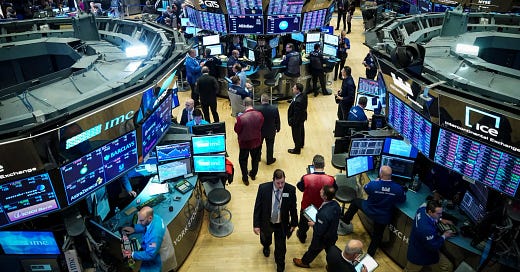Do company owners make better decisions when they have price information from a stock market? The price of a security reflects the expected discounted cash flows from that asset. Since anyone can trade on their private information, the security’s price reflects the sum total of information in the world, which is much more than the owner could possibly know on their own. (Since the owner can choose to buy or sell their own stock, the stock price must necessarily include their information, and other people’s). If the controlling owner of a company appoints a new CEO, and the stock price tanks, then they have learnt that appointing that CEO was a mistake which should be undone.
The trouble is that of circularity. If everyone knows that you will undo an action if the stock price tanks, then the stock price will never tank. It’ll be, on average, right, but with errors. This is why we can’t have a futures market on monetary policy, which would guide the Fed’s actions – since everybody knows the Fed will change policy to match what the market says will happen, nobody ever looks for information.
With the example of the Fed, we can note that they want it to be neither too high or too low. We can actually get around the circularity problem when we only want to undo an action in one direction. If you do an action which is beneficial, you are incentivized to keep it. Thus, the stock price will go up. Since everyone knows that you will undo an action which causes the stock price to go down, the stock price staying the same is itself evidence that the action was bad. Investors won’t go to the next step of anticipating that the change in actions it causes you to take will be good, because if they do it will prevent the actions from ever being taken.
This generalizes to prediction markets of any sort. Suppose there is a market on whether I will achieve some goal, and I announce the actions I will take as before. The same logic allows you to learn from the prediction market which actions will succeed or not succeed, and to actually turn markets into usable information.
But what about the supply side of information? I can say a few things. First, if everyone receives a bit of information which is free, then our world works. If everyone can invest in finding information at a constant marginal cost, then the market does not matter (because the owner of the company can invest in finding information indefinitely). If there are increasing marginal costs, then we are back to wanting many people to find information. If everyone faces the same costs, then either everyone invests in finding information, or no one does. (This implies that there are increasing returns to idea discovery. As companies get larger, they will be able to put more of their company on the stock market in absolute terms, and so could make better decisions). If people face heterogenous costs to find information, then putting more of the company on the stock market will increase the information found.
There is a third problem. Not only can the creator of the market gain information about the world, but so can their competitors. Competitors have both an incentive to free-ride, thus leading to these markets being underprovided in the event that there is some cost to making it, but may also be able to use the information to actively hurt their competitors. I have no idea how to measure this. It nevertheless suggests that stock trading is going to be substantially underprovided.
What prompted all this thinking was two strands of thought: how much of the gains to stock traders are captured by the stock trader, and my annoyance at being unable to do research because financial statements for privately held companies are not available. What I have shown suggests two things. First, it is inappropriate to bemoan high-frequency traders vacuuming up talented people from productive to unproductive uses. It is likely the case, yes, that the social spillovers of research and development are greater than the spillovers from stock trading. However, any reasonable eyeballing of the spillovers would show them to the substantial, and it is by no means a totally unproductive use of resources.
Second, the high fixed costs of being a publicly traded firms are injurious to society. We should reduce the accounting standards needed to be a publicly traded company. Ewens, Xiao, and Xu (2021) found that the regulatory cost to publicly-traded companies was about 4.1% of the median public firm. This is not a thing which has always been – we have passed laws, in particular Sarbanes-Oxley, which have increased the requirements for firm compliance. Given that stock trading is a public good, we should, if anything, subsidize publicly trading one’s firm. That may be impractical, but we should at least not put taxes on activities with positive spillovers.



Wait, how do you arrive at "high frequency trading is productive" from these arguments? The stock market is only informative when traders are acting on relevant information. High-frequency trading is the opposite; competing on speed without contributing external information of their own.
Good essay. I'd prefer if we didn't tax all intra-trading profits such that the tax on changing asset allocatoin composition is not punished.